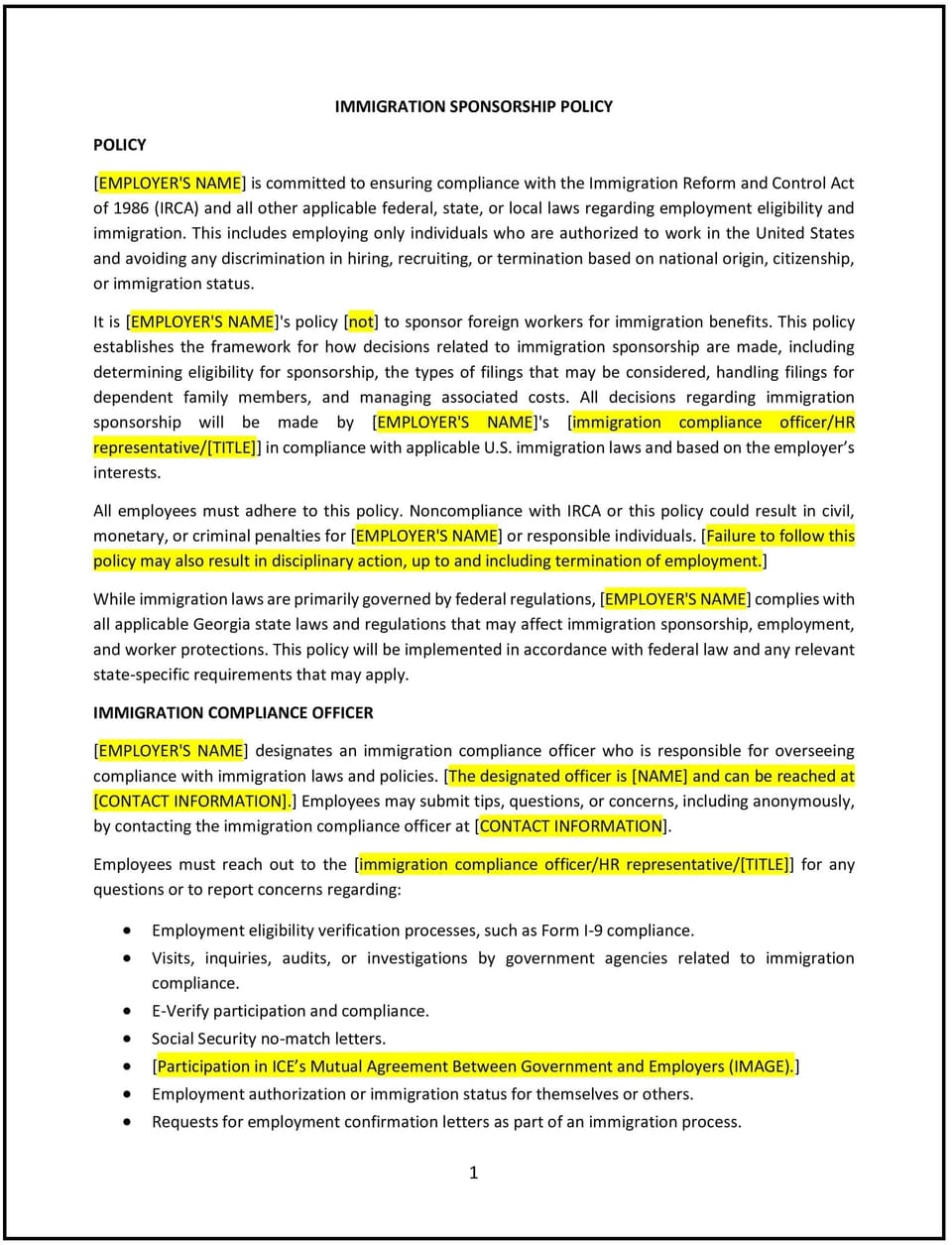Immigration sponsorship policy (Georgia)

Immigration sponsorship policy (Georgia)
This immigration sponsorship policy is designed to help Georgia businesses provide clear guidelines for sponsoring foreign nationals for work authorization. The policy outlines eligibility criteria, sponsorship procedures, and employee responsibilities to ensure a smooth and transparent process.
By implementing this policy, businesses can attract top talent, support workforce diversity, and navigate the complexities of immigration sponsorship effectively.
How to use this immigration sponsorship policy (Georgia)
- Define sponsorship eligibility: Specify the types of positions and employees eligible for sponsorship, such as roles requiring specialized skills or certifications.
- Outline application procedures: Provide a step-by-step guide for initiating sponsorship, including documentation requirements, timelines, and points of contact.
- Address costs: Clearly state which costs the business will cover (e.g., visa fees, legal expenses) and any costs the employee may be responsible for.
- Set expectations: Communicate the employee’s responsibilities, such as providing accurate information, meeting deadlines, and maintaining compliance with visa requirements.
- Monitor visa status: Establish a process for tracking visa expirations, renewals, and changes in work authorization to avoid disruptions.
- Include termination terms: Outline the steps to follow if the sponsored employee leaves the company, including notifying relevant immigration authorities.
- Communicate regularly: Share updates and guidance with sponsored employees to ensure they understand their rights and obligations throughout the sponsorship process.
- Review and update regularly: Periodically assess the policy to reflect changes in immigration laws, business needs, or workforce dynamics in Georgia.
Benefits of using this immigration sponsorship policy (Georgia)
Implementing this policy provides several advantages for Georgia businesses:
- Attracts top talent: Sponsorship opportunities make businesses more appealing to highly skilled foreign workers.
- Supports workforce diversity: Sponsoring employees promotes cultural and professional diversity within the organization.
- Reduces uncertainty: Clear guidelines provide employees and managers with a transparent understanding of the sponsorship process.
- Improves retention: Sponsored employees are more likely to remain with a business that supports their immigration needs.
- Reflects Georgia-specific considerations: Tailoring the policy to local industries and workforce needs ensures relevance and practicality.
Tips for using this immigration sponsorship policy (Georgia)
- Partner with experts: Work with immigration attorneys or consultants to navigate complex regulations and processes.
- Communicate expectations: Ensure employees understand their responsibilities and the company’s role in the sponsorship process.
- Monitor timelines: Track visa application and renewal deadlines to avoid lapses in work authorization.
- Foster inclusivity: Create a supportive workplace culture that values and respects employees from diverse backgrounds.
- Be proactive: Stay informed about changes in immigration laws that may impact your sponsored employees or future sponsorships.
Q: What positions are eligible for sponsorship under this policy?
A: Eligible positions typically include roles requiring specialized skills, certifications, or advanced degrees that are difficult to fill locally.
Q: What costs will the business cover for sponsorship?
A: Businesses should specify which costs they will cover, such as visa application fees, legal expenses, or relocation assistance, depending on company policy.
Q: How can employees initiate the sponsorship process?
A: Employees should contact HR or the designated immigration specialist to discuss eligibility and begin the application process.
Q: What happens if a sponsored employee leaves the company?
A: If a sponsored employee leaves, businesses should notify immigration authorities as required and ensure all necessary documentation is updated.
Q: How should businesses track visa statuses?
A: Businesses should maintain a secure system for tracking visa expirations, renewals, and other key dates to avoid disruptions in work authorization.
Q: Are employees responsible for any sponsorship-related costs?
A: Employees may be responsible for certain costs, such as dependent visa fees, unless otherwise specified by the business.
Q: How often should this policy be reviewed?
A: The policy should be reviewed annually or as needed to reflect changes in Georgia’s immigration laws or business practices.
This article contains general legal information and does not contain legal advice. Cobrief is not a law firm or a substitute for an attorney or law firm. The law is complex and changes often. For legal advice, please ask a lawyer.


